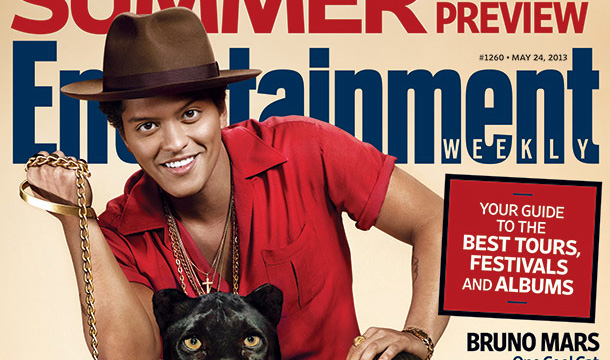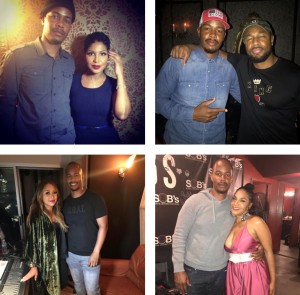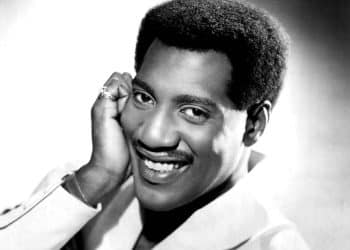Before Bruno Mars became the international pop star that we know him as today, he overcame a lot of doors closed in his face, not only for his music, but also for his race. In his cover story with EW, the Grammy winner, who is Puerto Rican, Jewish and Filipino, recalls a time when he was struggling to get on after writing the song "Nothin' On You" with his songwriting partners. Mars recounts having a meeting with an industry decision-maker (anonymous) and received a shocking reaction.
"He goes, 'Oh man, oh man, what a song,'" describes Bruno. "You know what kind of white artist we could break with this? Blond hair, blue eyes, we could make this kid the next thing!"
He adds: "It was just kinda sad. It was like, 'Man, what about the kid that played you the song and wrote it and produced it…what about that guy?'"
Although Bruno felt like he "wasn't even in the room," clearly he's in everyone's room today as one of the top pop talents.
"Nothin' On You" went on to be a chart-topping smash for Bruno and rapper B.o.B.
Bruno Mars is one of the most successful and popular music artists in the world today, but he recently opened up about a heartbreaking experience. The singer revealed that he was overlooked for an opportunity because they wanted someone who had white skin, blond hair and blue eyes instead. This news has caused shockwaves throughout the entertainment industry, as many people have been questioning why this type of discrimination still exists. In this article, we will explore Bruno’s story and how it relates to racism within the entertainment industry.
The “Uptown Funk” hitmaker spoke out on social media about his experiences with racism in Hollywood and explained why he felt like he was being discriminated against due to his race. He said that producers would rather hire someone else just because they looked more “white”. This sparked outrage among fans and supporters around the world, as well as other celebrities speaking out against such injustice.
Despite having experienced unfair treatment himself, Bruno wants everyone to understand that there are countless talented people from different backgrounds who aren’t getting the same opportunities as those who look more traditionally attractive or ‘white’. It’s time to break down these barriers so that every artist can shine regardless of their racial background or physical appearance.
Singer’s Remarks About Race And Discrimination In Music Industry
In recent remarks, singer Bruno Mars has discussed the issue of race and discrimination in the music industry. He spoke about his experience being overlooked for a role because he was not seen as someone “white, blond with blue eyes.” While this is an unfortunate example, it is also reflective of the larger issues that exist within the music industry today.
Mars noted that he had to work harder than many other artists who didn’t necessarily have to face these kinds of challenges in order to make it in the business. “I felt like I had to prove my talent every single time,” Mars said during an interview on CBS Sunday Morning. “It’s kind of discouraging because you start thinking: ‘Am I good enough?'” This speaks to how systemic racism can lead people to doubt their own abilities even when they are clearly very talented.
The conversation around racism and prejudice in popular culture continues to be an important one, especially given its prevalence throughout different industries. It’s clear from Mars’ comments that there is still much work left to be done if we want real change. To ensure progress towards a more equitable future, everyone must remain committed to recognizing and challenging discrimination wherever it may arise.
Response From Fans And Critics
Mars’ remarks have sparked a strong response from fans and critics alike. Many people have praised him for speaking out against racism in the music industry, recognizing that it takes courage to do so. Others are calling on the industry to make meaningful changes that will ensure greater opportunity and equity for all artists, regardless of their race or ethnicity.
At the same time, some believe Mars is overstating his experience with discrimination. They argue that he has still achieved success despite any challenges he may have faced due to his appearance and background. These criticisms demonstrate how difficult it can be to talk about racism openly without being dismissed by those who don’t understand its implications.
What’s certain is that this conversation is an important step towards making real change. Everyone must continue to take responsibility for challenging systemic injustice wherever it exists if we want a more equitable future. That means recognizing our own biases and taking action when we see something wrong—and holding others accountable too.
Conclusion
I. In conclusion, Bruno Mars’ comments about race and discrimination in the music industry have resonated with many people who feel that they’ve experienced similar mistreatment. His words were a powerful reminder of how much work still needs to be done when it comes to creating an equitable and anti-racist environment in the music world.
II. As we continue to strive for change, it’s important for us all to understand what racism looks like today – both on a large scale, as well as more subtle forms of prejudice within our own circles or industries. We also need to make sure that we support those speaking out against injustice, such as Bruno Mars, so the necessary progress can be made towards greater equality.
III. It takes courage and strength to speak up about issues of race and discrimination, especially in an industry where one may not always receive positive feedback for doing so. By opening up conversations around these topics, however, we can begin to create meaningful dialogue that will eventually result in real systemic changes which benefit everyone involved in the music business.
Founder and Creator of Singersroom.com and IncredibleWork.com. Follow me on Instagram at @gary.gentles.








